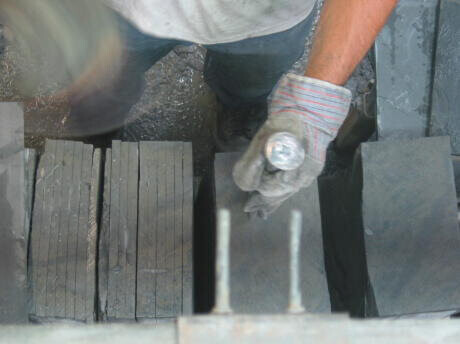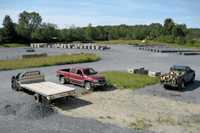Natural Roofing Slate: Thickness Explained

Roofing slates are split by hand with hammer and chisel to reveal a natural cleft surface. Splitters are very good at their trade but the thickness varies slightly and slates are grouped into different classes. This variation reinforces the fact that slates are a natural stone product not a uniformly consistent, mass-produced, synthetic material. While some quarries may split and sort to slightly different thickness groupings, most roofing slate is grouped into the following thickness categories:
3/16″ to 1/4″
Historically known as “commercial thickness”, but currently limited in production. Estimated weight is 800 pounds per square.
1/4″ to 3/8″
Also known as “nominal quarter inch” and it is the current industry standard thickness in North America. Slates in this category are split for a target of ¼”, thus some slightly thinner slates may be included. This is not intended to be a blend of ¼” and 3/8″ thick slates. If full 3/8″ thick slates are desired, 3/8-1/2″ slates should be ordered. Estimated weight is 1000 pounds per square, but most range from 875 to 950.
3/8″ to 1/2″
A form of “heavy slate” or “heavies”, this thickness range and thicker is generally made from coarse stone, which typically yields a greater amount of texture. Estimated weight of 1300 to 1500 pounds per square.
1/2″ to 3/4″
Custom produced heavies. Estimated weight is 1800-2000 pounds per square. Some quarries may break this category down into ½-5/8″ and 5/8-3/4″, in which case the 5/8-3/4 may weigh as much as 2500 pounds per square.
3/4 to 1″
Custom produced heavies. Estimated weight of 3000 pounds per square. Slates that are 20″ in length or longer AND ¾” or thicker should be specified to have 4 nail holes per piece.
1″ to 1 1/4″
Custom produced, roughly 4000 pounds per square.
1 1/4″ +
Custom produced, roughly 5000+ pounds per square.
Please note that:
The weight estimates above are conservative in the sense that for most varieties of slate in those thicknesses, the actual weight should be slightly lower. Most discussion of weight is brought on by concerns about whether a building’s structure or design can safely support a certain type of slate, and if the estimated weights are deemed acceptable for the structure, the actual slate weight will not be an issue.
Vermont slates are available in most thicknesses, except the 3/16-1/4 which can only be supplied in limited quantities from a few quarries.
Thank you for reading. Please call 802-287-2295 and email Nan at nan@newenglandslate.com with any questions. We are always happy to help.
